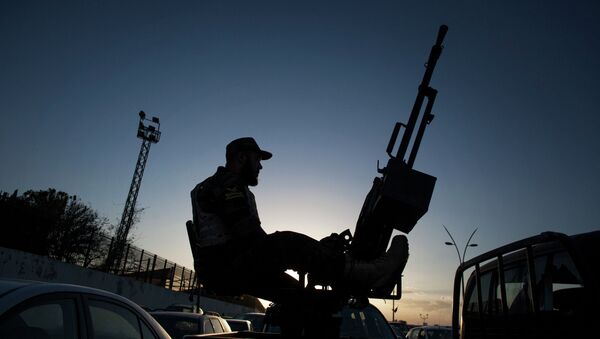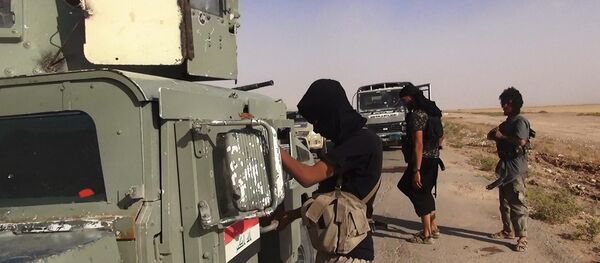“The ISIL positions have been identified and the militants have been surrounded. The Libyan Army is ready, one only needs to lift the embargo. If that happens, it can solve the ISIL problem before the end of the year,” Qweri said in an interview.
Asked to assess Arab military intervention in Libya, the information minister said “we would have asked for it if we had wanted intervention.”
“Perhaps, we could allow Egypt to intervene, but not all the Arab countries,” Qweri told Sputnik.
In May, the UN Security Council refused to lift its four-year arms embargo after Libya again urged the organization to give it means to deal with ISIL militants.
Libya has been torn by a power struggle between two rival governments and numerous rebel groups since a NATO invasion toppled Libyan leader Muammar Gaddafi in 2011. In early 2015, the ISIL militant group took advantage of a security vacuum in Libya and gained a foothold there.
The West is interested in keeping Libya volatile, while Russia’s approach toward the Libyan crisis is “wiser” and "more mature,” Libyan Information Minister said.
“The West supports chaos, rather than the General National Congress [in Tripoli]. Their strategy can be described as ‘acceptable violence,’ while Russia’s stance and Russian-Arab relations over the past 70 years have been wise and mature,” Qweri said in an interview.
Qweri noted that when the United Nations and the Arab League planned the invasion, Russia insisted that Qaddafi should be deposed by Libyans or Arabs, not NATO forces.
Libya has been split up between numerous rival forces since the start of the 2011 civil war and the UN-backed Western invasion to oust long-standing Libyan ruler Muammar Qaddafi.
At present, two de-facto governments are competing for power in the country. The internationally recognized Council of Deputies has its seat in the northern port city of Tobruk, while their rivals in the largest Libyan city of Tripoli have the support of a broad Islamist coalition called Libyan Dawn.
Tobruk government’s Prime Minister Abdullah Thani, who was in Moscow last April, bashed the NATO invasion for stripping the nation of effective government institutions.
According to Libyan Information Minister, Libya is considering the purchase of Kalashnikov semi-automatic rifles from Russia.
“I visited a Kalashnikov factory where I received offers and information on prices. I submitted this information to [Libyan Army General] Khalifa Haftar and we are forming a delegation to study this issue,” Qweri said in an interview.
He added that the Russian side welcomed Libya’s interest in its arms deliveries.
During Libyan Prime Minister Abdullah Thani’s visit to Moscow last April, Russia said it was ready to renew military contracts signed with late Libyan leader Muammar Gaddafi if the UN permits.
Libya has been under a UN arms embargo for four years. In May, the UN Security Council again refused to lift arms restrictions after Libya insisted it needed weapons to roll back the Islamic State (IS) insurgency.
The North African country has been struggling with unrest since Gaddafi was overthrown in a 2011 invasion by NATO forces.
Any foreign military bases on Libyan soil are absolutely ruled out said.
“This is totally unacceptable,” Qweri said. “Libyans have a proud Bedouin world understanding, and their sovereignty is the ‘red line’ they will not allow to be crossed. No American soldier will ever settle in our land… or else there will be a war.”
Libya has been engulfed in violence since the 2011 overthrow of the country's leader Muammar Gaddafi during an intervention by NATO forces.
Currently there are two rival governments in Libya, one based in Tobruk and the other in Tripoli. The forces of the internationally-recognized Libyan government in Tobruk are fighting numerous rebel groups, including Islamic State-affiliated militants.
Russia has been busy building trust with the internationally recognized Libyan authorities. Libyan Prime Minister Abdullah Thani traveled to Moscow last April to discuss the revival of some Gaddafi-era contracts with the Kremlin.



